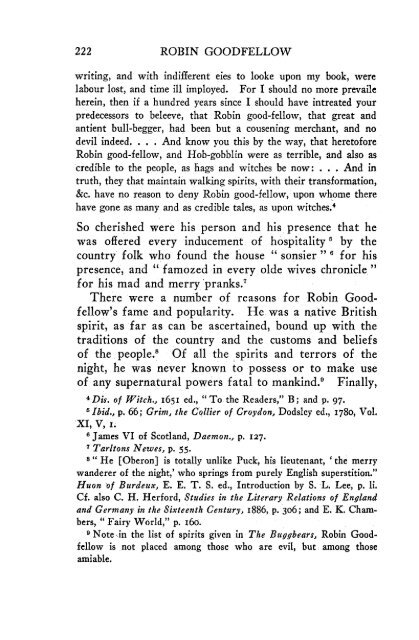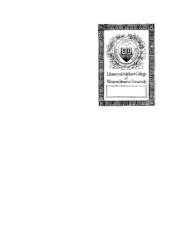THE ELIZABETHAN FAIRIES
THE ELIZABETHAN FAIRIES
THE ELIZABETHAN FAIRIES
You also want an ePaper? Increase the reach of your titles
YUMPU automatically turns print PDFs into web optimized ePapers that Google loves.
222 ROBIN GOODFELLOW<br />
writing, and with indifferent eies to looke upon my book, were<br />
labour lost, and time ill imployed. For I should no more prevaile<br />
herein, then if a hundred years since I should have intreated your<br />
predecessors to beleeve, that Robin good-fellow, that great and<br />
antient bull-begger, had been but a cousening merchant, and no<br />
devil indeed. . . . And know you this by the way, that heretofore<br />
Robin good-fellow, and Hob-gobblin were as terrible, and also as<br />
credible to the people, as hags and witches be now: . . . And in<br />
truth, they that maintain walking spirits, with their transformation,<br />
&c. have no reason to deny Robin good-fellow, upon whome there<br />
have gone as many and as credible tales, as upon witches.*<br />
So cherished were his person and his presence that he<br />
was offered every inducement of hospitality by the<br />
country folk who found the house " sonsier " for his<br />
presence, and " famozed in every olde wives chronicle "<br />
for his mad and merry pranks.?<br />
There were a number of reasons for Robin Goodfellow's<br />
fame and popularity. He was a ~ative British<br />
spirit, as far as can be ascertained, bound up with the<br />
traditions of the country and the customs and beliefs<br />
of the pe~ple.~ Of all the spirits and terrors of the<br />
night, he was never known to possess or to make use<br />
of any supernatural powers fatal to mankind.g Finally,<br />
4 Dis. of Witch., 1651 ed., "To the Readers," B; and p. 97.<br />
Ibid., p. 66; Grim, the Collier of Croydon, Dodsley ed., 1780, Vol.<br />
XI, v, I.<br />
James VI of Scotland, Daemon., p. 127.<br />
7 Tarltons Newes, p. 55.<br />
" He [Oberon] is totally unlike Puck, his lieutenaat, 'the merry<br />
wanderer of the night,' who springs from purely English superstition."<br />
Huon of Burdeux, E. E. T. S. ed., Introduction by S. L. Lee, p. li.<br />
Cf. also C. H. Herford, Studies in the Literary Relations of England<br />
and Germany in the Sixteenth Century, 1886, p. 306; and E. K. Cham-<br />
bers, " Fairy World," p. 160.<br />
Notch the list of spirits given in The Buggbears, Robin Good-<br />
fellow is not placed among those who are evil, but among those<br />
amiable.

















